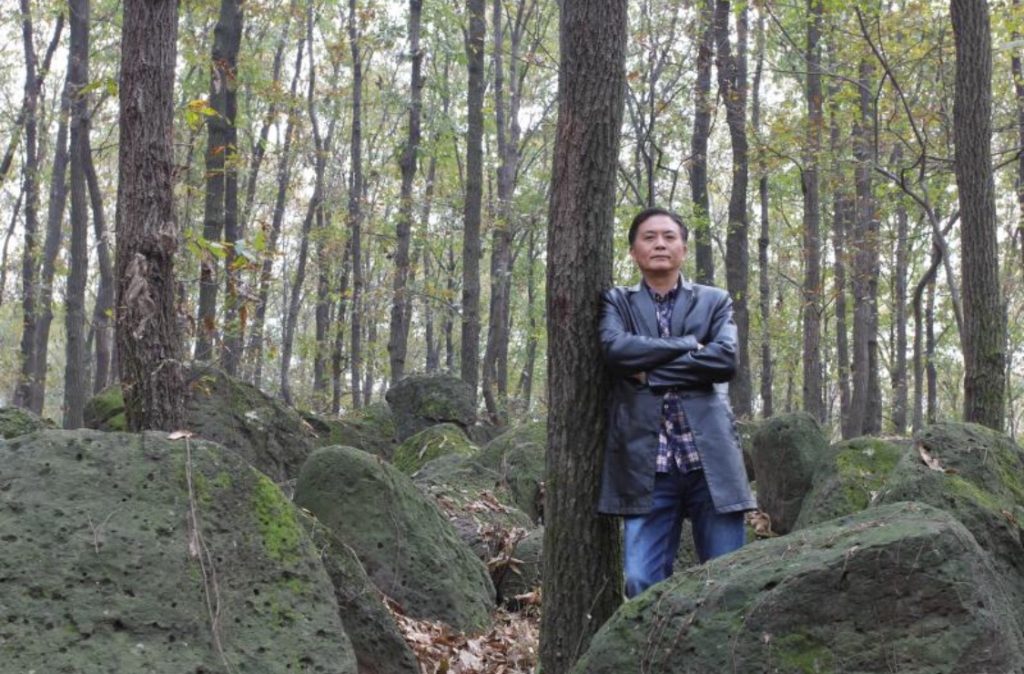
Gatha or Eulogy
—Dedicated to People Who Lost Their Lives due to the Epidemic
There is a path called death
A homeland to call a grave
An ocean wave called tears
A vast ocean called the spirit
A sky called loneliness
A kind of pining called clarity
There is a life called impermanence
A state called Being1
A Spring day called sorrow
A kind of sorrow called silence
A kind of love called opium poppy
There is a kind of hate called indifference
A kind of livelihood called the world of dust
A kind of encounter called serendipity
A kind of happiness called solitude
A kind of suffering called desire
A kind of night called insomnia
There is a fiery lamp called the sun
偈颂或悼词
—献给疫情中死去的人们
有一条道路叫死亡
有一个家园叫坟墓
有一朵浪花叫泪水
有一个海洋叫心灵
有一片天空叫寂寞
有一种相思叫清明
有一个生命叫无常
有一种境界叫真如
有一个春天叫悲伤
有一种悲伤叫沉默
有一种爱情叫罂粟
有一种仇恨叫冷漠
有一种生活叫尘世
有一种交往叫邂逅
有一种幸福叫孤独
有一种痛苦叫欲望
有一个夜晚叫白夜
有一盏灯火叫太阳
Eyes
I can see your eyes now
Two crystals among Spring’s rays
Like viewing two stars, without darkness
Viewing an oasis, without a desert
I am imagining your beauty
Your kindness and demure
But I dare not remove your face mask
Dare not reveal scars of this era
眼睛
我只能看见你的眼睛了
春光里的两颗水晶
仿佛只看见星星,不见黑暗
只看见湖泊,不见沙漠
我想象着你的美
你的善良和羞怯
但我不敢掀开你的口罩
不敢揭开这个时代的伤疤
Jade Orchid
Jade orchid blooms serenely
Then slowly withers away
Like a sheet of white paper
Words unwritten, but already turned to ashes
A young girl in a white skirt
Appears in this world, suddenly missing
Or, a flash of lightning2
Illuminating, me and your black night
H1N1, COVID-19
Jade orchid blooms quietly, then slowly withers away
玉兰花
玉兰花静静地盛开
又静静凋谢
就像一张白纸
还没写字,就已化为灰烬
身着白裙的少女
刚刚来到人世,突然失踪了
或者,只是一道闪电
照亮了,我和你的黑夜
H1N1,COVID-19
玉兰花,静静地盛开,又凋谢
On Earth
Dying as a result of infection is no different than murder.
In my heart I am completely unwilling!
—Fang Fang
Never have I encountered war
Never experienced earthquakes or hurricanes
Only remembering as a child, I endured starvation
As a youth, perhaps some suicidal thoughts
A few decades pass instantly: spring flowers, autumn moon3
Walking by day and resting by night, gluttony and lust
I am infatuated with this world of dust
More and more moved by mountains and rivers
What is a singular life and death?
What is a fleeting human life?
Let me experience a bit more
Tonight, let me wake upon this beautiful Earth
在地球上
如果因染疫而死,那无异于他杀,
我是于心不甘的!
—方方
我没有遭遇过战争
也未经历过地震、飓风
只记得童年,忍受过饥饿
年青时,或许有过自杀的念头
一晃几十年,春花秋月
日行夜卧,食与色
我已越来越恋这尘世了
越来越被山川感动
什么是生死如一
什么是人生如寄
那就让我多寄一会儿吧
今夜,让我醒在这美丽的地球上
February, the Second Month
Second month, all the rain cannot equal the world’s tears
February, a magpie’s chirps like the crow’s agonized cries
February, bundles of hill flowers gathered into immense circles4
February, hoping indignation and sorrow are a kind of virus
February, the black night is a long-lasting hard biscuit
February, lungs become frost-bitten cabbage in the snow
February, outside a window a turtledove singing the waterhen’s song
February, hoping the dawn will be like a great river washing everything
February, lies zombie-walking on the barren Earth
February, truth like old potatoes starting to sprout
February, all native places gradually become distant places
Second month, hoping the papaya’s fragrance remains in our minds
二月
二月,所有的雨水都不抵人世泪水
二月,喜鹊的叫声也仿佛乌鸦唳啸
二月,山坡上的花朵围成巨大圆圈
二月,只愿愤怒和悲哀是一种病毒
二月,黑夜是一块加长的压缩饼干
二月,双肺变成雪地上冻坏的白菜
二月,斑鸠在窗外唱着苦恶鸟之歌
二月,只愿曙光如大河冲洗这一切
二月,谎言在空空大地上僵尸而行
二月,真理像陈年的土豆开始发芽
二月,所有的故乡都渐成遥远他乡
二月,只愿我们心中还有木瓜芬芳
Sorrow
The virus departs from the bat
Keeping bamboo rats and snakes company
Someone caught and fed on bamboo rats and snakes
The virus also seized the chance to feed on his lungs
This person fell
Family and friends suffered the same misfortune too
This is the year 2020
Gradually escalating misfortune and sorrow
But compared with such things
What is more sorrowful than hiding all of this
?
悲哀
病毒离开了蝙蝠
与竹鼠和蛇为伍
有人捕食了竹鼠和蛇
病毒也伺机咬他的肺
这个人倒下了
亲人和朋友也跟着倒了霉
这是2020年
不断升级的不幸与悲哀
但与这些相比
还有什么比隐瞒这一切更悲哀
?
Notes
[1] Tathātā, also translated as “thusness” or “suchness,” referring to one’s realization of truths in the Dharma (cosmic order).
[2] An allusion to an important gatha in the Diamond Sutra: “All conditioned dharmas are like dreams. Illusions, bubbles, shadows, like dew drops and a lightning flash.”
[3] Literary allusion to a line from a poem by the last Tang Emperor Li Yu (937-978): “When will the spring flowers and autumn moon end?” (春花秋月何时了?)
[4] In China, it is customary for guests at a funeral service to prepare flower arrangements in the form of funerary wreathes to honor the dead.
